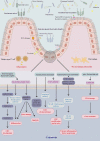Colorectal cancer and gut microbiota studies in China
- PMID: 37482657
- PMCID: PMC10364665
- DOI: 10.1080/19490976.2023.2236364
Colorectal cancer and gut microbiota studies in China
Abstract
Colorectal cancer (CRC) is the third most common malignant tumor worldwide. The incidence and mortality rates of CRC have been increasing in China, possibly due to economic development, lifestyle, and dietary changes. Evidence suggests that gut microbiota plays an essential role in the tumorigenesis of CRC. Gut dysbiosis, specific pathogenic microbes, metabolites, virulence factors, and microbial carcinogenic mechanisms contribute to the initiation and progression of CRC. Gut microbiota biomarkers have potential translational applications in CRC screening and early diagnosis. Gut microbiota-related interventions could improve anti-tumor therapy's efficacy and severe intestinal toxic effects. Chinese researchers have made many achievements in the relationship between gut microbiota and CRC, although some challenges remain. This review summarizes the current evidence from China on the role of gut microbiota in CRC, mainly including the gut microbiota characteristics, especially Fusobacterium nucleatum and Parvimonas micra, which have been identified to be enriched in CRC patients; microbial pathogens such as F. nucleatum and enterotoxigenic Bacteroides fragilis, and P. micra, which Chinese scientists have extensively studied; diagnostic biomarkers especially F. nucleatum; therapeutic effects, including microecological agents represented by certain Lactobacillus strains, fecal microbiota transplantation, and traditional Chinese medicines such as Berberine and Curcumin. More efforts should be focused on exploring the underlying mechanisms of microbial pathogenesis of CRC and providing novel gut microbiota-related therapeutic and preventive strategies.
Keywords: Gut microbiota; anti-tumor therapy; colorectal cancer; microbial biomarkers; microbial carcinogenesis; microbiota interventions.
Conflict of interest statement
No potential conflict of interest was reported by the author(s).
Figures


Similar articles
-
Diet-mediated gut microbial community modulation and signature metabolites as potential biomarkers for early diagnosis, prognosis, prevention and stage-specific treatment of colorectal cancer.J Adv Res. 2023 Oct;52:45-57. doi: 10.1016/j.jare.2022.12.015. Epub 2022 Dec 31. J Adv Res. 2023. PMID: 36596411 Free PMC article. Review.
-
Meta-Analysis of Altered Gut Microbiota Reveals Microbial and Metabolic Biomarkers for Colorectal Cancer.Microbiol Spectr. 2022 Aug 31;10(4):e0001322. doi: 10.1128/spectrum.00013-22. Epub 2022 Jun 29. Microbiol Spectr. 2022. PMID: 35766483 Free PMC article.
-
Progress of gut microbiome and its metabolomics in early screening of colorectal cancer.Clin Transl Oncol. 2023 Jul;25(7):1949-1962. doi: 10.1007/s12094-023-03097-6. Epub 2023 Feb 15. Clin Transl Oncol. 2023. PMID: 36790675 Review.
-
Role of the Gut Microbiota and Its Metabolites in Tumorigenesis or Development of Colorectal Cancer.Adv Sci (Weinh). 2023 Aug;10(23):e2205563. doi: 10.1002/advs.202205563. Epub 2023 Jun 1. Adv Sci (Weinh). 2023. PMID: 37263983 Free PMC article. Review.
-
Expanding the Colorectal Cancer Biomarkers Based on the Human Gut Phageome.Microbiol Spectr. 2021 Dec 22;9(3):e0009021. doi: 10.1128/Spectrum.00090-21. Epub 2021 Dec 22. Microbiol Spectr. 2021. PMID: 34935421 Free PMC article.
Cited by
-
Establishing and clinically validating a machine learning model for predicting unplanned reoperation risk in colorectal cancer.World J Gastroenterol. 2024 Jun 21;30(23):2991-3004. doi: 10.3748/wjg.v30.i23.2991. World J Gastroenterol. 2024. PMID: 38946868 Free PMC article.
-
Gut microbiota characteristics of colorectal cancer patients in Hubei, China, and differences with cohorts from other Chinese regions.Front Microbiol. 2024 Jun 19;15:1395514. doi: 10.3389/fmicb.2024.1395514. eCollection 2024. Front Microbiol. 2024. PMID: 38962132 Free PMC article.
-
Postoperative cognitive dysfunction in elderly patients with colorectal cancer: A randomized controlled study comparing goal-directed and conventional fluid therapy.Open Med (Wars). 2024 Mar 27;19(1):20240930. doi: 10.1515/med-2024-0930. eCollection 2024. Open Med (Wars). 2024. PMID: 38584828 Free PMC article.
-
Gut microbiota affects the activation of STING pathway and thus participates in the progression of colorectal cancer.World J Surg Oncol. 2024 Jul 25;22(1):192. doi: 10.1186/s12957-024-03487-2. World J Surg Oncol. 2024. PMID: 39054486 Free PMC article.
-
Causal Relationship Between Gut Microbiota and Leukemia: Future Perspectives.Oncol Ther. 2024 Dec;12(4):663-683. doi: 10.1007/s40487-024-00300-8. Epub 2024 Sep 1. Oncol Ther. 2024. PMID: 39217582 Free PMC article. Review.
References
-
- Dai Z, Coker OO, Nakatsu G, Wu WKK, Zhao L, Chen Z, Chan FKL, Kristiansen K, Sung JJY, Wong SH, et al. Multi-cohort analysis of colorectal cancer metagenome identified altered bacteria across populations and universal bacterial markers. Microbiome. 2018;6(1):70. doi:10.1186/s40168-018-0451-2. - DOI - PMC - PubMed
Publication types
MeSH terms
Substances
Grants and funding
LinkOut - more resources
Full Text Sources
Medical
